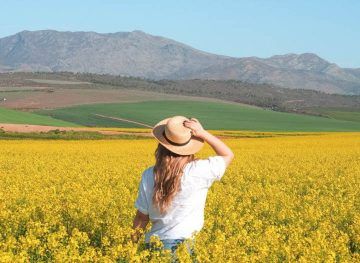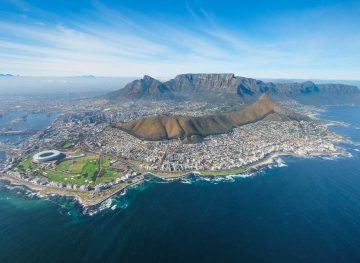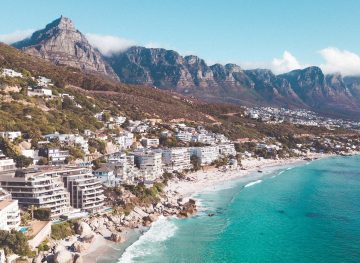Thank you to South African local Natalie, from Tails of a Mermaid, for contributing this post.
You might have heard that there’s a severe drought in Cape Town right now. If you’re planning a trip to this beautiful city any time soon, this is probably causing some serious worries.
Here you’ll find the Cape Town drought explained for visitors, what to expect when you travel here and most importantly, how you can help us save water.
The Cape Town Drought
If you’ve heard that the drought situation is really serious right now, you’ve heard right. Cape Town is experiencing the worst drought in our history; we are going to be the first major city in the world to have the taps run dry.
The city is preparing for a state of emergency, with vital water supplies at an all-time low. While city officials are working hard to create solutions, locals and visitors have a big responsibility to use water sparingly and save every drop.
You can absolutely still have a fantastic time in Cape Town, without wasting resources, but locals ask that you take special care when you visit. Small changes that might seem insignificant to you can make a huge difference when implemented by almost 4 million people.
While you’re having a great time, be sure to keep the drought at the top of your mind and implement our water-saving tips consistently.
Frequently Asked Questions
What is actually going on?
Cape Town’s summers have historically been very dry, with very wet winters. Historically, Cape Town has experienced winter rains that can last for days, filling up dams and ensuring enough water for the dry summer months.
However, the last few winters have been worryingly dry, which has resulted in severely low dam levels. Years ago, water restrictions were implemented but consistently dry winters have resulted in critically low water supplies, which have led to Day Zero’s imminence.
Are tourists still welcome in Cape Town during the drought?
Absolutely. Tourism is the lifeblood of the city’s economy and without our visitors, we would not be able to support much of our infrastructure. Visitors are always welcome in Cape Town, and during the drought, they are encouraged to save like a local at every opportunity.
What is Day Zero?
Day Zero is the day on which the City of Cape Town will turn off the taps. This means that there won’t be any water for showers, dishes or drinking coming out of any taps across the city.
Day Zero has been moved from July 2018 and is now planned for 2019.
Visitors coming into the city before Day Zero will have access to tap water (which is safe to drink) but will have to keep water use to a minimum in order to help save as much as possible.
Once the taps have been turned off, residents will have to queue at 200 water points across the city, for 25 liters of water per person per day. There are areas where taps might stay on, in order to keep the economy running and in the interest of public health – for instance, hospitals.
But as a rule, residents and visitors should expect to have little to no access to water.
For more up real-time information, check out the City of Cape Town website.
Can I Visit Cape Town After Day Zero?
We don’t know how long the drought will last, but it is meant to be temporary. Cape Town will remain tourist friendly and we encourage you to still visit. Just keep in mind there will be changes and read ahead to see what you can do to be prepared for your trip.
Contact your hotel before your visit to find out what their plans are regarding the drought – some areas in the countryside and Winelands have access to groundwater, boreholes, and aquifers. Most luxury hotels are bringing water into the city for the use of the guests. And the V&A Waterfront has their own salt water desalinization plant.
How can I save water while I’m trying to have a good time on vacation?
By implementing lots of small changes, you can make a huge difference! Remember that when you go back home, you’ll have all the water you could want, but Cape Town locals will still be in the drought.
Make sure you read our water-saving tips below so that you can help – every single drop counts!
How to Save Water While in Cape Town
- Showers are only allowed once per day. Quick showers of no more than 90 seconds are being very strongly encouraged. This is really easy to do if you don’t let the water run until it becomes hot. Just jump into the shower to wet your skin, turn off the water while you lather your body and only turn the tap on to rinse your body again.
- Washing your hair every day is not permitted. You can extend your time between washes by using dry shampoo. Cute “between wash” hairstyles like braids and ponytails are extremely useful. You can also save a ton of water by using a leave-in conditioner instead of rinsing your conditioner out in the shower.
- Make sure to use a bucket in your shower to catch excess water. Please use this water to flush the toilet. If your hotel or guesthouse hasn’t provided you with a shower bucket, please insist on one. It’s small changes like this that can save literally millions of gallons of water if everyone makes them.
- “If it’s yellow, let it mellow” is a phrase that is being adopted all across Cape Town – even in public spaces and the workplace.
- Re-use your towel for the duration of your visit. You are obviously squeaky clean when you get out of the shower, so please hang your towel up to dry instead of leaving it on the floor or bed. Please also go as far as leaving a note in your room asking the hotel/guesthouse staff NOT to supply you with a clean towel.
- Don’t let the sink run. Use a plug when washing your face instead of letting the tap run. Turn off the tap while you brush your teeth. Use a cup to rinse your mouth out.
- Re-use your clothes as much as possible and don’t wash an item after every wear. Make sure to check whether something needs to be washed before you throw it into the laundry.
- Carry hand sanitizer with you. Avoid using water to wash your hands as much as possible.
Consider the people of Cape Town and how they are going to manage once you return home. These changes might seem like an effort, but being a responsible tourist is absolutely vital.














Great article with good insights. It will help people who are planning to go to Cape Town.